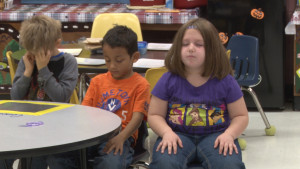I first began teaching eight years ago in Nepal. I’d never taught in a classroom before. Two weeks before the school year started, the principal told me I was going to teach science. I was excited, made all kinds of elaborate plans and developed grand visions for what my classroom was going to look like. And then school started, and the next couple of months was a lot of flopping on my face and getting up again. As I look back, I’m impressed with how fearless I was, or naive; maybe a little bit of both.
After about six months, the novelty of a new country and new class started to wear off. I became homesick and felt very lonely, but every morning I showed up and was willing to learn. And then slowly, slowly something started to shift. I stopped showing up for me and started showing up for them. By watching my students closely and learning what interested them, I became more creative, and the lessons started to create themselves. I was inspired to do the best I could because I loved my students.
As teachers, our greatest strength is the love we have for our students. This school year, practice directing that natural care and attention towards yourself.
Teaching is one of hardest jobs in the world. And so often, we make it even more difficult by being hard on ourselves. This is the part we do have power over. You can’t always change what is happening outside your classroom or your mind, but you can change what is happening inside. How?
One practice that helps when I get frustrated, down on myself, or just can’t relax, is to imagine the people I care about being happy. Try this practice.
Close your eyes and bring someone you care about to mind, someone that’s easy to love and say, “May you be happy.” In your mind, watch this person become happy. Notice what it feels like in your body to see this person happy. Repeat the words, “May you be happy.” After a couple of minutes, start to direct that attention to yourself and say, “May I be happy.” Repeat these words, and watch yourself become happy. Notice what it feels like in your body to see yourself happy.
You don’t have to be perfect. Your students, your classroom, your plans don’t have to be perfect. You’ll flop again and again. And that’s okay. This is why we practice. You can practice using the natural compassion you have for your students, friends, family and pets to develop that same care and attitude for yourself. Some days it’s easy and some days it’s hard. Just as we encourage our students: we encourage ourselves, “keep going.” No matter what happens throughout the year, you can always return to this practice.
May you be happy.

